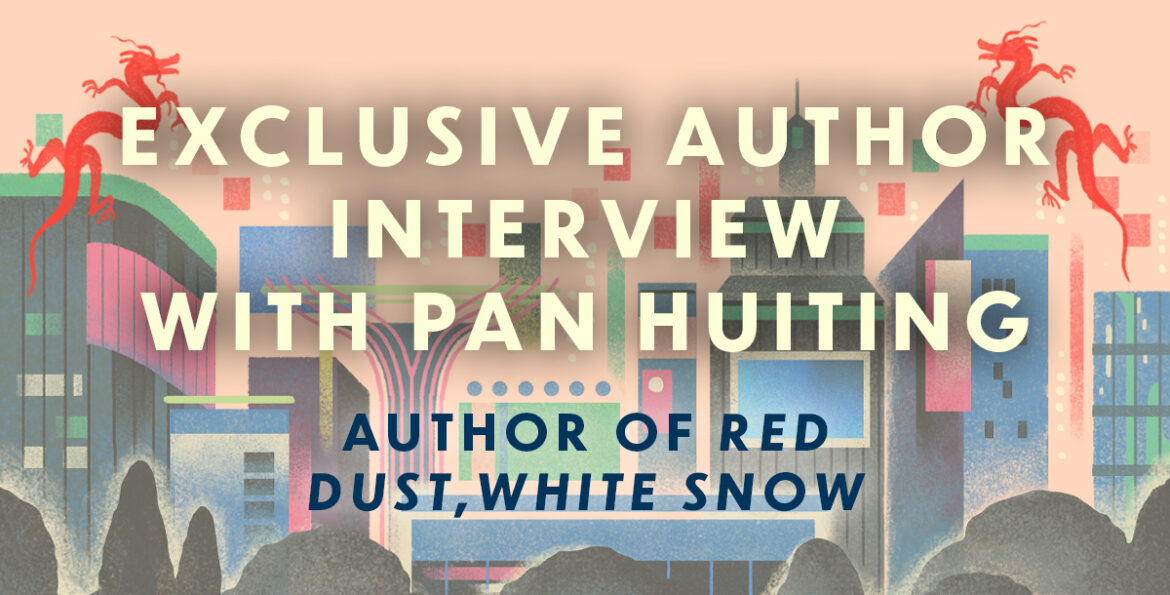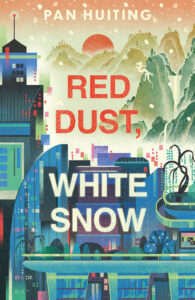

Pan Huiting: Interview
- 15th August 2023
- Category : Author,Interviews & Blogs
Pan Huiting lives and works in Singapore. After studying Fine Art at Nanyang Technological University, Singapore, she completed a Master of Arts in Singapore and a Master of Research in Fine Art at the Royal College of Art, London. Red Dust, White Snow is her debut novel.
Your novel Red Dust, White Snow features a nameless office lady as the main protagonist. What was behind your decision to leave her nameless?
She’s the nameless everylady. Also, I’m extremely fond of Beckett (he is referenced twice in Red Dust, White Snow), especially with this image of a vestigial-bodied protagonist stuck in a glass jar in The Unnamable.
If you could live in the dream world, would you?
We’ve never lived anywhere else.
This is your debut novel; do you have any advice for new and upcoming authors?
Finish what you started. Even if it never gets published. Always finish.
Social Media plays such a massive role in Red Dust, White Snow that it is literally a governing force in most of the population’s lives. Do you see this as the future in our world?
This future is already here. Increasingly, everything we see and read is determined by algorithms.
Do you have any specific methods towards your writing process?
I work mostly chronologically. Though sometimes I may backtrack and insert chapters here and there, or rewrite certain scenes.
What has your experience as a debut author been like?
Perpetual amazement. Every time something I’ve made has gone out into the world. I don’t think that feeling will ever go away.
What were your methods for incorporating Chinese and East Asian mythology into this modern world?
Mythology underpins the stories we tell about ourselves (the state, corporations etc. all employ mythology in the form of propaganda and advertisement to shape the citizen or the consumer). Red Dust, White Snow is full of mythology of all kinds. The dream world is animated by Chinese and East Asian mythology to reflect a new world order in the novel. Usually, the fantastic serves as a contrast to reality, but here the fantastical elements of mythology highlight the dissolution of reality into the fantastic.

Do you have any advice on balancing different themes and different worlds?
That’s one of the fun parts of thinking. Drawing connections between the most disparate things. You almost always get outrageous results.
Do you see yourself writing about similar themes in the future or possibly expanding the Red Dust and White Snow worlds?
I didn’t set out to do so, but dreams feature prominently in the book I’m currently working on. Whether it sees the actual light of the day is another matter, but I’m taking my own advice and finishing it.
What is one lesson you’d want readers to take away from Red Dust, White Snow?
No lessons. It’s up to everyone what they take away.
*
Keep reading for a sneak peek of Red Dust, White Snow…
Even the artists. Was this the aesthetic life they wanted, or did it turn out to be
anaesthetic? She knew Alex had come close to quitting several times but could not because his
wife was expecting their first child. There was a short film he had been working on for several
years: he’d wanted to enter it into a competition but could not make the deadline. She had seen
an earlier clip he sent to the group chat for feedback, something of an animated fever dream of
a battle between ant-like creatures and fungal invaders, obviously zombie-ant fungus inspired.
To survive, the eusocial insects agree to surrender their consciousness as long as the sun was
in the sky for the benefit of the fungus, commuting to towers with the right conditions for the
fungus to thrive. She thought the imagery was intricate – baroque, a ballet of filiform ascosporic
and pseudopodal shapes − for the first thirty seconds. The latter three-quarters looked
noticeably less detailed. The winner last year was his art school junior − single, living with his
parents. Although Alex had added his congratulations to the never-ending string under the post
he had been visibly shaken, watching the award-winning film on loop. The jejune had grown,
while he was still scrabbling in the dust. Once, he had been the recipient of such congratulations,
as valedictorian, landing the job at Verge. Once.
She travelled home surrounded by people living double lives. The train doors opened
and a time traveller squeezed in, shoving her backwards into a rancher who did not look up
from feeding glowing hay to a unicorn, pelt shining like quicksilver. Floating above the
creature’s head, near the tip of its spiralling horn, was a steadily filling heart meter. All around
her, people were absorbed in fabulous content, whether it was watching Josie Wong as a fox
spirit, or battling, catching, raising − kirins, dragons, chimeras, unicorns, manticores. A parallel
fantastic universe.
She was pleased to find her bulk order of sleeping pills on her doorstep − she had bought
a variety to prevent drug tolerance. Expedited delivery had been worth it. The whine of the
drill had hit her the moment she stepped off the bus. It was time again for electrical rewiring,
one of those ‘cyclical works’ carried out on a regular basis for maintenance − something she
looked forward to as much as menstruation. ‘The same QUALITY, CONVENIENCE and
COMFORT, regardless of the age of your block!’ declared multiple digital display panels all
over the estate. In the past, she took note of the ‘EXPECTED DATE OF COMPLETION’,
holding it close like some eschatological date when she would be delivered from her auditory
hell, until she observed the eternal recurrences of such projects. There were always upgrades
to be done − to circuitry, to pipes, to pumps; cables re-layed, buildings re-roofed, linkways reconstructed. While she was at work, a fence had been built over the footpath and now she had
to take a detour to get to the economy rice stall.
Clambering over boxes to get to her kitchen, she made a cup of chamomile tea to take
with her pills. She had reduced her nightly routine to just removing her makeup, doing away
with dinner and leaving her shower to the following morning. The blasts of the drill felt like
physical blows but when she peered out of the window, there was no visible construction site
− just endless rows of flats obscuring her view. Once again, her assailant was omnifarious and
unknown. It might not be electrical rewiring, or even within the estate but on a bordering road
− in which case jurisdiction would lie with some other department. Guidelines accompanied
by cute cartoons on the website stated drilling and hammering should be avoided between ten
thirty at night to seven in the morning. She checked her phone − it was only nine. She stuffed
her ears with foam and switched on her bedside lamp, newly-bought, which functioned as a
sleep aid by emitting a soft, rhythmically pulsing light.
She tossed and turned, reaching for the place on the other side, where the mundanity of
the world would stop, melatonin-induced black at the end of a film.
Make no mistake, mundaneness − it can grind a person down. Note the unmistakeable
tang of soil in the word ‘mundane’, from mondain – ‘of this world, worldly, earthly, secular’
in Old French. In Chinese, life in this world is literally written as ‘red dust’ − referring to the
earth kicked up in the air by ceaseless traffic. So everyone wanders in this mortal realm, stirring
up dust, until they become dust themselves.
Red Dust, White Snow is out 17 August. Order now from Blackwell’s and Waterstones.
To find out more about Huiting visit her author page.














